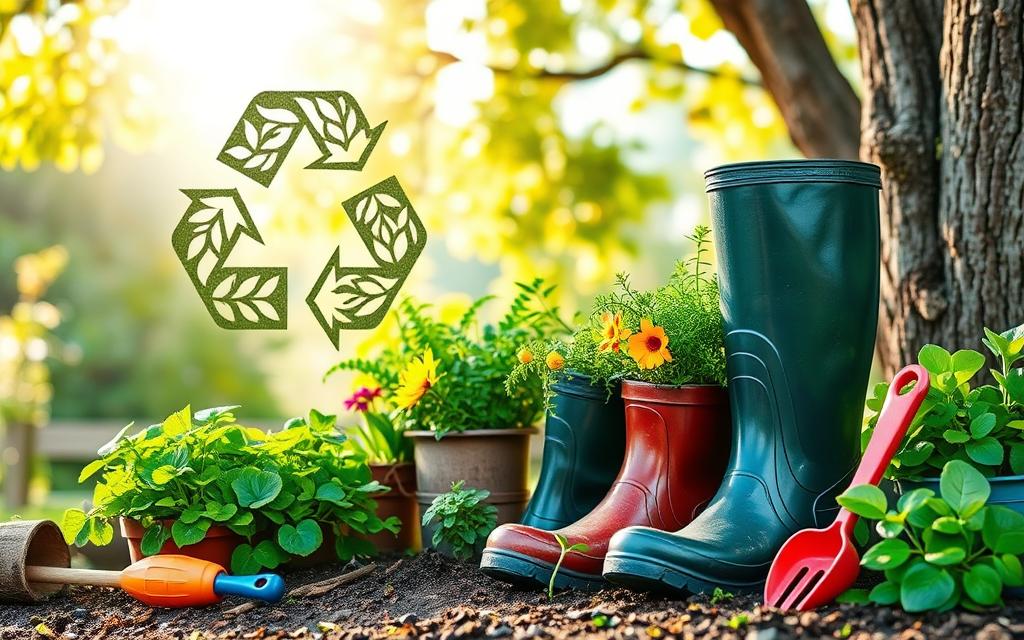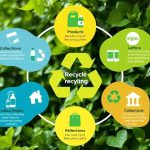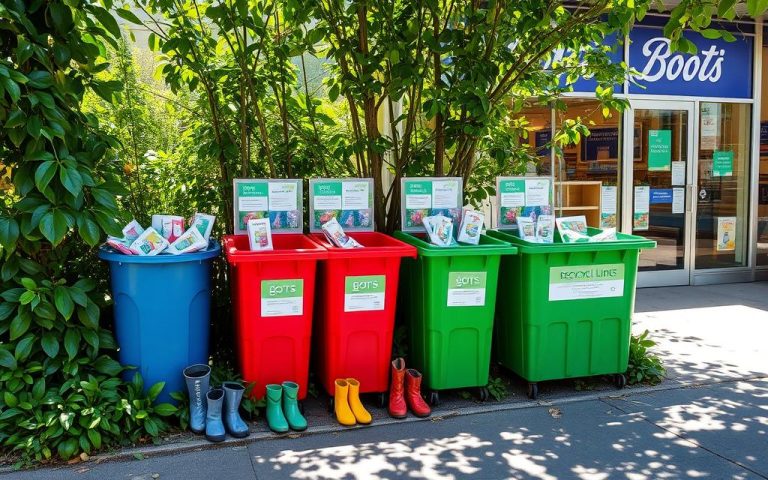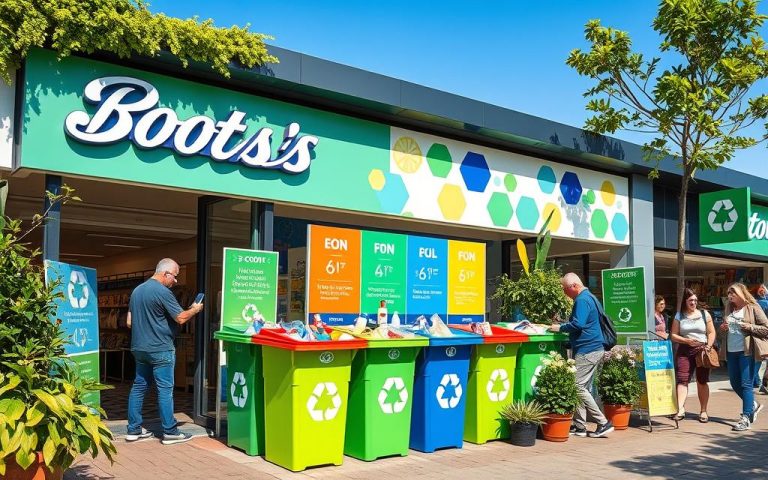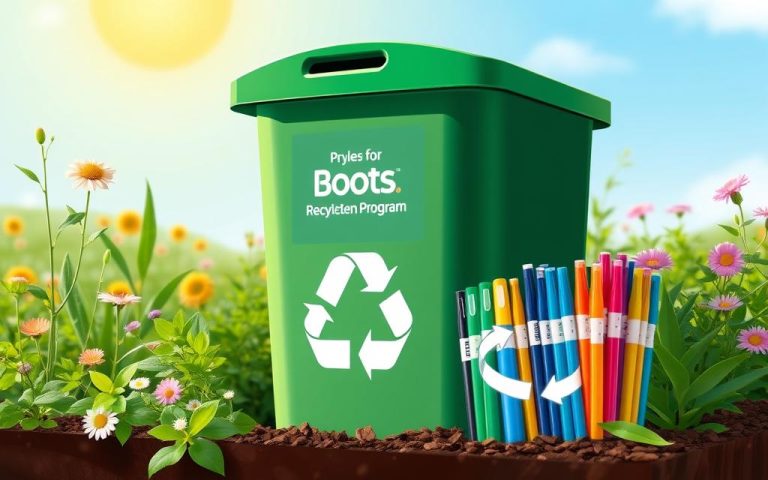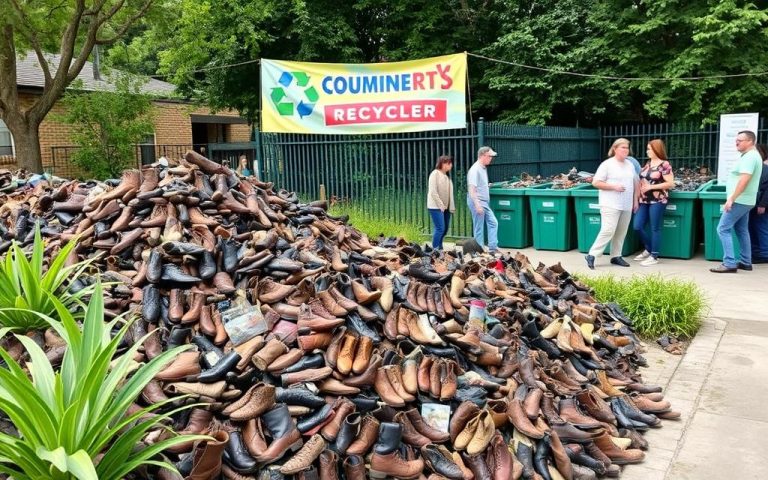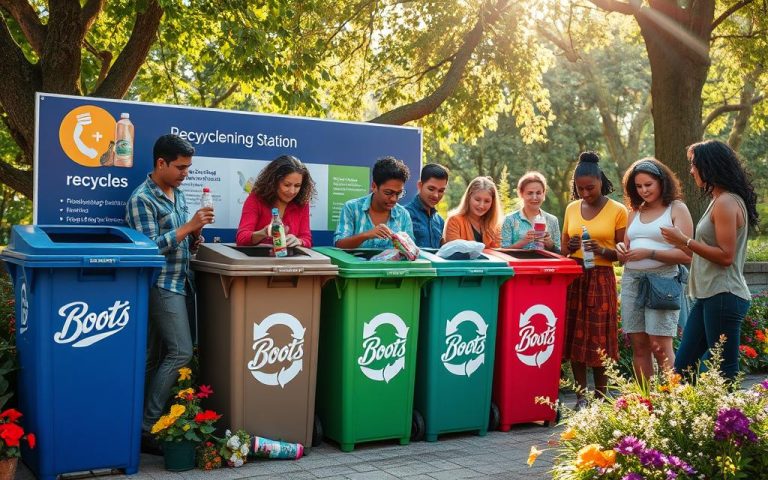How to Recycle Wellington Boots: A Sustainability Guide
Wellington boots, or wellies, are vital for outdoor enthusiasts and professionals. Recycling sustainable wellies is crucial due to growing environmental concerns. The carbon footprint of these boots depends on material, manufacturing, durability, and recyclability.
Not all wellies are eco-friendly. Some are made from natural, biodegradable resources. Others contain plastic materials like PVC, which are difficult to recycle. Eco-friendly boots offer a solution to reducing waste and environmental impact.
This guide explores methods to recycle wellington boots. We’ll highlight sustainable practices that protect our planet. You’ll learn about boot materials and innovative recycling options.
These insights will help environmentally conscious consumers make responsible choices with their wellies.
Understanding Wellington Boot Materials and Sustainability
Wellington boots have evolved from leather to sustainable materials. This change reflects environmental awareness and footwear technology advancements. Wellies now showcase a blend of eco-consciousness and innovation.
Modern wellies use various materials with different environmental impacts. Knowing these materials helps buyers make eco-friendly choices. Let’s explore the options available for conscious consumers.
Common Materials in Wellington Boot Production
- Natural rubber: Renewable and biodegradable
- Recycled rubber: Reduces manufacturing environmental impact
- PVC: Non-biodegradable synthetic material
- Synthetic blends: Mixed materials with varying sustainability levels
Sustainable vs Non-Sustainable Materials
Identifying sustainable boot materials requires examining production processes and material composition. Eco-friendly rubber is a major step forward in wellie manufacturing. It offers a greener alternative to traditional options.
| Material Type | Sustainability Rating | Environmental Impact |
|---|---|---|
| Natural Rubber | High | Renewable, Biodegradable |
| Recycled Rubber | Medium-High | Reduced Manufacturing Emissions |
| Standard PVC | Low | Non-Biodegradable, Toxic Emissions |
Environmental Impact Analysis
PVC wellies pose significant environmental risks. They often contain harmful chemicals that accumulate in ecosystems. Sustainable materials offer a responsible alternative, reducing ecological damage.
“Choosing sustainable wellington boots isn’t just a fashion statement—it’s an environmental commitment.” – Eco Fashion Expert
Consumers can support sustainability by choosing wellies made from eco-friendly rubber. Look for brands with clear sourcing and manufacturing practices.
Why Sustainable Wellington Boots Matter
The UK sells about 27 million pairs of wellington boots yearly. This high number poses a big environmental challenge. Sadly, around 300,000 tons of footwear end up in landfills each year.
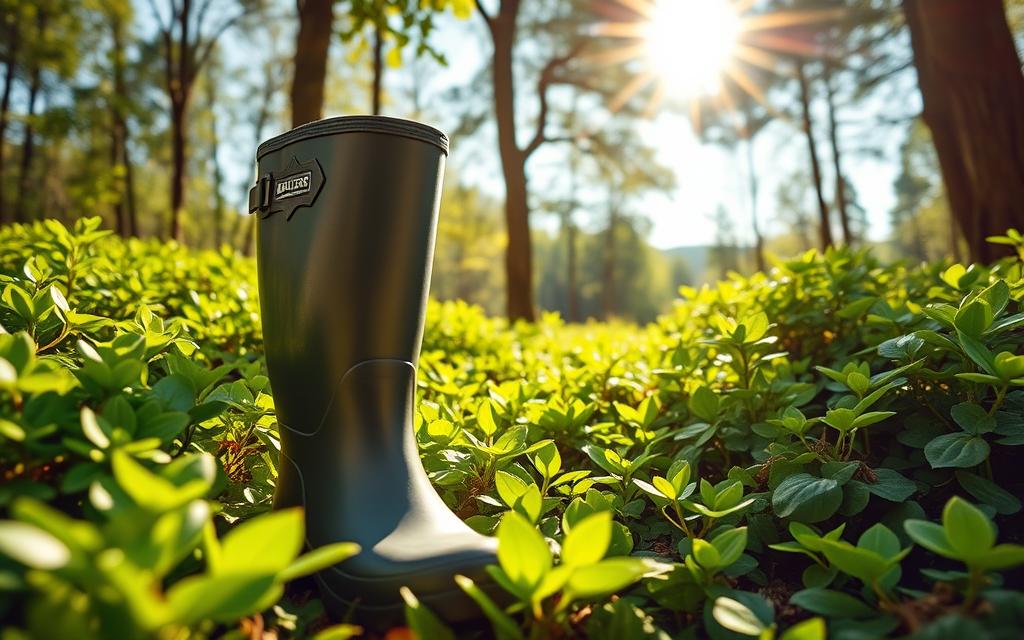
Sustainable wellies are crucial for reducing the industry’s environmental impact. Let’s look at some key facts:
- 90% of footwear is discarded within the first year of use
- PVC wellington boots have extremely low biodegradability
- Traditional rubber production contributes to deforestation and pollution
“Sustainable choices in footwear can dramatically reduce environmental degradation.”
People are becoming more aware of their environmental duty. Studies show that 74% prefer fixing their clothes and shoes instead of binning them. This change shows a growing need for sustainable boot options.
| Environmental Impact Metric | Traditional Boots | Sustainable Boots |
|---|---|---|
| CO2 Emissions | High | Significantly Reduced |
| Material Sustainability | Non-Biodegradable | Eco-Friendly Materials |
| Landfill Contribution | High | Minimised |
Choosing sustainable wellington boots helps reduce environmental impact. Brands like Lemon Jelly are making boots with 90% less CO2 emissions than usual ones. This approach lessens ecological harm and supports a circular economy.
How to Recycle Wellington Boots
Recycling wellington boots requires careful consideration of materials and available programmes. Wellies present unique challenges due to their complex composition. However, 90% of textile waste can be repurposed.
Understanding wellington boot recycling programmes is vital for sustainable disposal. Many brands now offer specialised boot recycling initiatives. These help reduce the environmental impact of discarded wellies.
Manufacturer Take-Back Programmes
Several brands provide dedicated wellington boot recycling programmes. Key options include:
- Hunter Boots offers a comprehensive recycling scheme
- Joules provides free return and recycling services
- Le Chameau accepts boots for sustainable reprocessing
Local Recycling Options
Local recycling centres might accept wellington boots depending on their material composition. About 70% of UK residents know about footwear recycling methods.
Preparation Steps for Recycling
Preparing boots for recycling involves several essential steps:
- Clean boots thoroughly
- Remove non-recyclable elements like lining
- Check specific programme guidelines
- Ensure boots are dry before submission
*Keeping wellies in active usage remains the most eco-friendly approach*
An estimated 40% of wellington boots are discarded yearly. Recycling programmes offer a sustainable alternative to landfill disposal.
Recycling wellington boots reduces waste and creates new products. Up to 25% of recycled rubber is transformed into innovative solutions.
Leading Sustainable Wellington Boot Brands
Eco-friendly boot makers are changing the wellington market. Buyers now want boots that perform well and are made ethically. These boots combine top quality with care for the planet.
Several makers are transforming the industry with green practices. They’re creating new ways to make boots that last and help the earth.
Le Chameau: Natural Rubber Excellence
Le Chameau shines in eco-friendly boot making. They craft wellingtons by hand with great care. Their process is kind to the environment.
- Using 100% natural rubber from sustainable plantations
- Employing traditional crafting techniques
- Creating durable boots with minimal environmental impact
Hunter’s Recycling Approach
Hunter has a clever plan for old boots. Customers can return used boots to be recycled. This helps create a circle of reuse in boot making.
Aigle: Sustainable Rubber Innovations
Aigle shows great care for the earth in their work. They make boots that last and help the planet.
- Sourcing 100% natural rubber from responsible plantations
- Producing over 60 handmade welly styles in France
- Focusing on durability and environmental responsibility
| Brand | Sustainability Feature | Rubber Source |
|---|---|---|
| Le Chameau | Hand-crafted boots | Natural rubber plantations |
| Hunter | Recycling programme | Vulcanised natural rubber |
| Aigle | 60+ handmade styles | Certified natural rubber |
Sustainable wellington brands are not just selling boots—they’re creating a movement towards environmental responsibility.
Extending Your Wellies’ Lifespan
Looking after your wellies is key to making them last longer. Good care helps them survive beyond one season. This cuts waste and saves you money.
Proper maintenance can prevent dry rot in rubber boots. Here are some top tips to keep your wellies in top shape.
“90 times out of 100, rubber boots experience dry rot if not properly cared for” – Footwear Preservation Research Group
Effective wellington boot maintenance involves several key strategies:
- Clean boots after each use with mild detergent
- Condition rubber surfaces every few weeks
- Store in temperature-controlled environments
- Avoid direct sunlight exposure
A quality repair kit can help fix small tears at home. This can stop you from having to buy new boots too soon.
| Maintenance Activity | Frequency | Purpose |
|---|---|---|
| Cleaning | After each use | Remove dirt, prevent material degradation |
| Conditioning | Every 4-6 weeks | Prevent rubber dry rot |
| Storage Check | Monthly | Inspect for potential damage |
For long-term care, always dry your wellies before storing them. Wet storage can lead to smells and mould. This could shorten how long your boots last.
Alternatives to Recycling: Donation and Repurposing
Old wellington boots offer exciting opportunities for donation or creative repurposing. You can extend their usefulness and support environmental sustainability. These options are far better than sending them to landfill.
Charity Donations and Second-Hand Sales
Donating wellington boots can provide significant social benefits. Nearly 300 million pairs of footwear are discarded annually in the United States. This creates substantial environmental challenges.
By donating, you can support local charity shops and help those who can’t afford new footwear. Additionally, you’ll reduce waste in landfills.
- Support local charity shops
- Help individuals who cannot afford new footwear
- Reduce waste in landfills
Creative Repurposing Ideas
Upcycle boots into functional or decorative items. Transform old wellies with innovative projects.
- Garden planters with proper drainage
- Unique outdoor bird houses
- Decorative storage containers
- Children’s craft projects
Environmental Benefits of Boot Reuse
Reusing wellington boots offers substantial environmental advantages. The global footwear industry contributes 1.4% of global greenhouse gas emissions. Every small action makes a difference.
Every pair of boots repurposed is a step towards reducing carbon footprint.
| Reuse Method | Environmental Impact |
|---|---|
| Donation | Reduces landfill waste |
| Upcycling to Planters | Promotes sustainable gardening |
| Craft Projects | Extends product lifecycle |
These alternatives turn old wellington boots into valuable resources. You’ll support community needs and environmental conservation. Give your old boots a new life today.
Conclusion
Eco-friendly footwear choices need a team effort from everyone involved. Less than 1% of global textile waste is recycled into new textiles. This means our approach to wellington boots must change drastically.
Recycled materials offer promising alternatives with performance similar to standard materials. Many wellie makers are now focusing on sustainability. They’re developing recycling programmes and exploring new ways to reduce waste.
Your actions matter in this sustainability journey. Extend your boots’ life through careful maintenance. Look into donation options when you’re done with them. Choose eco-friendly alternatives made from recycled rubber, organic cotton, or bamboo.
New technologies like molecular tagging are emerging. Recycling infrastructure is also expanding. These developments make truly sustainable wellington boots more achievable. Our choices today will shape the footwear industry’s environmental future.
FAQ
What makes wellington boots sustainable?
Sustainable wellies use eco-friendly materials like natural rubber and recycled components. These reduce environmental impact and support responsible production. They also minimise carbon footprint and prioritise ecological conservation.
How can I tell if my wellington boots are recyclable?
Check the boot’s materials and the manufacturer’s recycling guidelines. Boots made from natural rubber are more likely recyclable. Look for recycling symbols or contact the manufacturer directly for confirmation.
What should I do with old wellington boots that are still in good condition?
Consider donating to charity shops or selling second-hand. You could also repurpose them as garden planters or storage containers. These options help reduce waste and extend the boots’ useful life.
Why are standard PVC wellington boots environmentally problematic?
PVC is non-biodegradable and releases harmful chemicals during production and disposal. These boots take centuries to decompose and pollute the environment. They can also leach toxic substances into soil and water systems.
How can I maintain my wellington boots to extend their lifespan?
Clean your boots regularly with mild soap. Store them in a cool, dry place away from direct sunlight. Use repair kits for minor damages and address wear promptly.
Invest in high-quality boots with durable construction to maximise their longevity.
Are there any brands specialising in sustainable wellington boots?
Yes, brands like Le Chameau, Hunter, and Aigle lead in sustainable wellington boot manufacturing. They use natural rubber and implement recycling initiatives. These brands prioritise durability and environmental responsibility in their production processes.
What environmental benefits come from recycling wellington boots?
Recycling wellies reduces landfill waste and conserves resources. It also lowers greenhouse gas emissions and supports a circular economy. By recycling or repurposing boots, you help reduce the footwear industry’s environmental impact.
Can all wellington boot materials be recycled?
Not all materials are easily recyclable. Natural rubber and some synthetics can be recycled. Standard PVC and mixed-material boots are more challenging to recycle.
Always check recycling programme guidelines and consult manufacturers for precise instructions.
